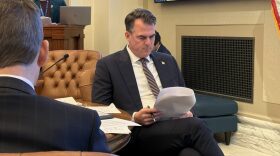Gov. Mary Fallin signed legislation last week regulating the rideshare industry. The so-called “Uber” bill clarifies insurance requirements and creates a “zero tolerance” drug and alcohol policy. But the new law intentionally leaves out sexual orientation and gender identity in its non-discrimination clause.
Marcus Prince pulls his white Jeep Liberty up in front of the Capitol. He drives for the rideshare company Lyft and greets riders with a fist bump as they climb into his car. It’s a way to break the ice with people from all kinds of different backgrounds.
“I've met people that have come from other countries. I've met people that have grown up here and have never stepped foot outside of their town or city or wherever it’s from,” Prince says.
He has driven for Lyft for about a year. He enjoys meeting new people, and he loves the freedom to drive when he wants.
But Prince is gay, so when the state legislature specifically removed “sexual orientation and gender identity” from a nondiscrimination clause in a bill regulating the rideshare industry, it hit close to home.
“It hurts me personally because it's a feeling of unwelcome,” Prince says.
The new law creates a statewide framework for all rideshare companies. It dictates how much insurance a driver must carry, requires all companies to have permits and provides penalties for any noncompliance.
The law originated in the house, but when it made it to the senate floor, state Senator Jason Smalley (R-Stroud) added an amendment modifying the blanket nondiscrimination clause.
Smalley says it was important for that clause to be consistent with others in state statute, and no other law prohibits discrimination on the basis of sexual orientation or gender identity.
“We had multiple members in the senate that were not going to not only want to hear the bill, they were prepared to vote no and even try to kill the bill if that section was not changed,” Smalley says.
He calls the measure “good legislation,” and insists the amendment is not a personal attack. It was pragmatic. Without it, he wouldn’t have gotten the necessary votes, and rideshare companies like Uber and Lyft might have pulled out of the state.
“We felt like the product on the table needed to be passed, and we knew that Uber was not going to do any discrimination whatsoever,” Smalley says.
“So we had to strike that in order to get the bill passed. That's the process up here. No matter if it has to do with this on discrimination, if it has to do with oil, if it has to do with anything else, education, there's going to be things that people don't like.”
Both Uber and Lyft include protections for sexual orientation and gender identity in their nondiscrimination clauses.
The companies declined interview requests but say they’ll fire a driver who refuses service to someone based on sexual orientation or gender identity.
“So here you have companies that are coming into Oklahoma that have policies in place that protect people such as the LGBT community and you have the state legislature that’s looking to try to cut some of that protection out,” says state Representative Jason Dunnington (D-Oklahoma City).
“We're accepting an amendment to this bill that even the companies won't recognize because it's not a part of their policies,” he says.
Dunnington spoke out against the amendment during a house floor debate, but he ended up voting for the bill because several of the people in his district use rideshare services.
“I think that having that access is an important thing but was just really frustrated with the unnecessary discrimination that was added on the Senate side,” Dunnington says.
And that phrase -- unnecessary discrimination -- is one that stands out to Marcus Prince, the Lyft driver. Prince doesn’t understand why a rideshare driver would choose not to drive someone because of their sexual orientation.
“There are some older drivers, they might try to pull that. Then again, I don't see it. You're also doing this to make money, so are you really going to discriminate against a person who could easily be your next $40 ride?” Prince says.
Even if someone did refuse to drive a customer, Prince says the company would find out through a review. The amendment is toothless, but he personally thinks it’s hurtful.
“To be honest, it doesn't matter. It really doesn't matter,” Prince says.
“In the only sense that it matters, it’s our government going above and beyond to tell us how much we are not welcome as a class of people.”
For the most part, Prince likes the new law. He just wishes lawmakers wouldn’t have tarnished it by omitting four words.
-----
As a community-supported news organization, KGOU relies on contributions from readers and listeners to fulfill its mission of public service to Oklahoma and beyond. Donate online, or by contacting our Membership department.







